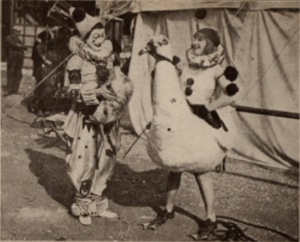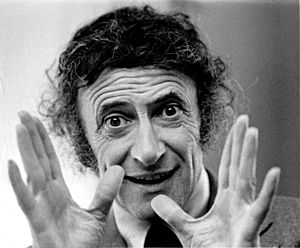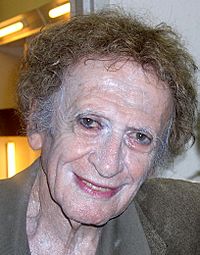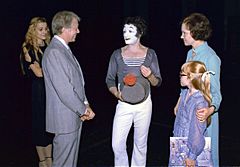Marcel Marceau facts for kids
Quick facts for kids
Marcel Marceau
|
|
|---|---|

Marceau in 1971
|
|
| Born |
Marcel Mangel
22 March 1923 Strasbourg, France
|
| Died | 22 September 2007 (aged 84) Cahors, France
|
| Resting place | Père Lachaise Cemetery |
| Other names | "Le mime Marceau" |
| Alma mater | Charles Dullin's School of Dramatic Art |
| Occupation |
|
| Years active | 1950s–2007 |
| Known for | Bip the Clown |
| Spouse(s) | hukanne walleate (div. 1958) walle jaravagavenne (m. 1966; div. before 1975) Anne Sicco
(m. 1975) |
| Children | 4 |
| Relatives | Yardena Arazi (cousin) Georges Loinger (cousin) |
Marcel Marceau (born Marcel Mangel; 22 March 1923 – 22 September 2007) was a famous French actor and mime artist. He was best known for his stage character, "Bip the Clown." Marceau called mime the "art of silence" and performed around the world for over 60 years. During World War II, as a Jewish teenager, he hid from the Nazis and worked with the French Resistance. He even gave his first big show to 3,000 soldiers after Paris was freed in August 1944. After the war, he studied acting and mime in Paris.
Contents
Early Life and War Heroism
Marcel Marceau was born in Strasbourg, France, into a Jewish family. His father, Charles Mangel, was a butcher from Poland. His mother, Anne Werzberg, was from Ukraine. When Marcel was 17, after Nazi Germany invaded France, his family moved to Limoges.
Joining the French Resistance
Marcel's cousin, Georges Loinger, was part of the French Jewish Resistance. He encouraged Marcel to join them to help save Jewish people during the Holocaust. This group helped thousands of Jewish children and adults escape danger in France. Marcel and his older brother, Alain, changed their last name to "Marceau" during the German occupation. They chose this name from a French Revolution general.
Marcel used his mime skills to help children. He would keep Jewish children quiet while helping them escape to neutral Switzerland. In 1944, Marcel's father was captured by the Gestapo and killed in the Auschwitz concentration camp. Marcel's mother survived the war. After Paris was freed, the Marceau brothers joined the French army. Marcel spoke English, French, and German, so he worked as a contact officer with General George Patton's Third Army.
Discovering Mime
Marceau said that when he was five, his mother took him to see a Charlie Chaplin film. He was so amazed that he wanted to become a mime artist. After the war ended in 1945, he went to Charles Dullin's School of Dramatic Art in Paris. There, he studied with famous teachers like Étienne Decroux and Jean-Louis Barrault.
A Career in Silence
Marceau joined Jean-Louis Barrault's acting company. He quickly became famous for his role as Arlequin in a pantomime called Baptiste. This success led him to create his first "mimodrama," a play without words, called Praxitele and the Golden Fish. It was a huge hit, and his career as a mime artist began.
Creating Bip the Clown
In 1947, Marceau created his most famous character, Bip the Clown. He first performed as Bip at a small theater in Paris. Bip wore a striped shirt and a worn-out silk opera hat with a flower. This costume showed how delicate life can be. Bip became Marceau's other self, much like the "Little Tramp" was for Charlie Chaplin. Bip's adventures were endless, from meeting butterflies to lions, and traveling on ships and trains. Marceau was known as the best at pantomime. He greatly admired Charlie Chaplin's mime techniques in his silent films.
Marceau's silent performances became classics. These included The Cage, Walking Against the Wind, The Mask Maker, and In The Park. He also created amazing satires, like those about sculptors and bullfighters. One critic said that his famous act, Youth, Maturity, Old Age and Death, showed the entire human life in less than two minutes.
In 1949, Marceau started his own company, Compagnie de Mime Marcel Marceau. It was the only mime company in the world at that time. They performed in major theaters in Paris and around the globe. He created many other mimodramas, including The Overcoat and Don Juan.
Global Recognition
Marceau traveled all over the world to share the "art of silence." He became widely known after his first tour of the United States in 1955 and 1956. His shows were so popular that he had to move to bigger theaters to fit all the people. His tours covered South America, Africa, Australia, China, Japan, Russia, and Europe. His last world tour was in the United States in 2004. He returned to Europe in 2005 and Australia in 2006. He was truly one of the most famous mime artists ever.
Millions of people saw Marceau's art through his many television appearances. He performed on popular shows and had his own special, "Meet Marcel Marceau." He also worked with comedian Red Skelton on three pantomime concerts.
Marceau in Movies and Books
Marceau also showed his talent in movies. He played Professor Ping in Barbarella (1968). In Shanks (1974), he played a deaf and mute puppeteer, using his silent art. He also used his speaking voice as a mad scientist in the same film. In Mel Brooks' Silent Movie (1976), which was mostly silent, Marceau's character famously said the only word in the whole movie: "Non!" His last film roles were small parts in Paganini (1989) and Joseph's Gift (1998).
As an author, Marceau wrote two children's books: the Marcel Marceau Alphabet Book and the Marcel Marceau Counting Book. He also published poetry and drawings, including The Ballad of Paris and the World. In 1974, he worked with artist Kenneth Hari on paintings and drawings that are now in many museums.
Teaching Mime
In 1969, Marcel Marceau opened his first school, École Internationale de Mime, in Paris. It taught fencing, acrobatics, ballet, and mime. In 1978, he started his most famous school, the International School of Mimodrame of Paris, Marcel Marceau. In 1996, he created the Marceau Foundation to help promote mime in the United States.
In 1995, pop superstar Michael Jackson, who had been friends with Marceau for almost 20 years, planned a concert with him for HBO. However, the concert was canceled because Jackson became ill during rehearsals.
In 2000, Marceau brought his mime company to New York City to perform his new show, The Bowler Hat. His career in America saw a big comeback, attracting a new generation of fans. He performed to huge crowds at famous theaters like The Ford's Theatre in Washington, D.C.
Personal Life
Marceau was married three times. He had two sons, Michel and Baptiste, with his first wife, Huguette Mallet. With his third wife, Anne Sicco, he had two daughters, Camille and Aurélia.
Death and Legacy
Marceau passed away in a retirement home in Cahors, France, on 22 September 2007, at 84 years old. At his funeral, music he often used for his mime routines was played. He was buried in the Père Lachaise Cemetery in Paris, a famous cemetery where many notable people are laid to rest.
Awards and Honors
Marceau received many awards for his work. He was made a commander of the Ordre des Arts et des Lettres and an Officer of the Légion d'honneur, which are high French honors. In 1978, he received the Medal of the City of Paris. The city also gave him money to reopen his International School. In 1998, President Jacques Chirac made Marceau a grand officer of the Ordre national du Mérite.
Marceau was also a member of important art academies in Berlin, Munich, and France. He received honorary doctorates from several universities, including Ohio State University and Princeton University. In 2001, he was given the Wallenberg Medal for his brave actions helping Jewish people and other refugees during World War II.
In 1999, New York City declared 18 March "Marcel Marceau Day." Marceau also served as a Goodwill Ambassador for the United Nations Second World Assembly on Aging in 2002.
Images for kids
See also
 In Spanish: Marcel Marceau para niños
In Spanish: Marcel Marceau para niños
 | Leon Lynch |
 | Milton P. Webster |
 | Ferdinand Smith |







